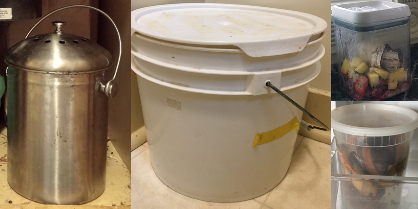Food Scraps/Organics

State law bans food scraps from the trash
Food scraps are:
- Parts of food items that are typically discarded rather than eaten: peels, rinds, cores, eggshells, seeds, pits, bones, coffee grounds and paper filters, loose-leaf tea & paper tea bags, and fats/oils/grease.
- Food that was not finished: "plate scraps" or leftovers that went bad. Any type of food can become scraps--bread, pasta, soup, veggies, fruit, sauces, meat, dairy, sweets, etc.
- These items can go in your food scrap collection container. You may be able to put other items in with your food scraps depending where your scraps end up. Read on to learn more
What do I have to do? If it was once part of something alive, like a plant or animal, it does not belong in the landfill. Food scraps and yard debris (leaves, grass, brush clippings, etc.) will need to be managed separately from trash.
The first step is to collect your food scraps in a container. There's no right way to do this. You can reuse a large yogurt tub or bucket, buy a food scrap container, or keep a plastic bag in the freezer--find a method that works for you based on how much food scraps you generate, how often you want to empty and wash your container, etc. You'll empty your container regularly into a backyard bin if you compost in your yard, hire a hauler to empty your food scrap tote or bucket if you subscribe to a pick-up, or dump your scraps into a food scrap cart at the Gleason Road transfer station or town transfer stations. 
Why separate food scraps from the trash? Food scraps and yard debris make up ~30% of a typical Vermont family’s waste; at restaurants and cafeterias, food scraps can be over half the waste. Keeping these materials out of the landfill has a big impact:
- When it is trapped in a landfill, food waste decomposes slowly, and without oxygen. This process produces methane, which is a greenhouse gas 84 times more powerful than CO2 over a 20-year period.
- Food scraps contain valuable nutrients that are good for the soil. Finished compost can be used in gardens, farms, and landscaping.
- Generating less trash conserves landfill space.
- Composting puts your waste to work supporting composters, local farmers, and food scrap haulers.
- Without food scraps in it, garbage is cleaner and less smelly.
